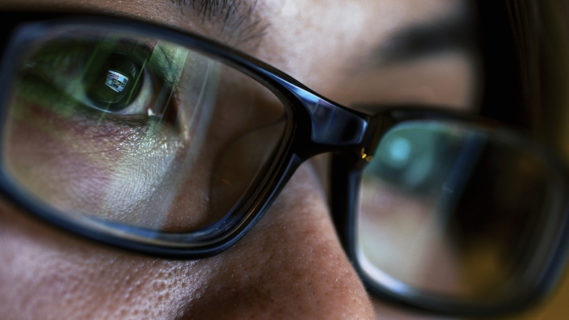The Science Behind Screen Eyewear: How They Work and Why You Need Them
In today’s digital age, we spend a significant amount of time looking at screens – whether it be on our phones, computers, or other electronic devices. While this technology has certainly made our lives easier, it has also had an impact on our eyesight. That’s where screen eyewear comes in. In this blog post, we will explore the science behind screen eyewear, how they work, and why you need them.
First, it’s important to understand how screens affect our eyes. Screens emit blue light – a type of high-energy visible (HEV) light that can penetrate deep into the eye and cause damage to the retina over time. This can lead to eye strain, headaches, and even long-term vision problems.
Screen eyewear, also known as blue light glasses, are designed to block or filter out this blue light. There are two main types of screen eyewear: those with blue-blocking lenses and those with blue-filtering lenses.
Blue-blocking lenses work by reflecting blue light away from the eyes. These lenses are usually tinted yellow or orange and can be helpful for those who spend a lot of time working on computers or using other electronic devices.
Blue-filtering lenses, on the other hand, work by absorbing blue light. These lenses are clear and do not affect the color of what you see on your screen. They are often used by people who work in environments with high levels of blue light, such as photographers or graphic designers.
So, how do screen eyewear work? Blue light glasses are made with special coatings or materials that block or filter out blue light. Some glasses have a special coating on the lenses that reflects blue light away from the eyes. Others have a yellow or orange tint that blocks blue light from entering the eyes. Some glasses use a combination of both methods to provide maximum protection.
But why do we need screen eyewear? As mentioned earlier, blue light can have a harmful effect on our eyesight over time. By wearing screen eyewear, we can reduce our exposure to blue light and minimize the risk of eye strain, headaches, and other vision problems. This is especially important for people who spend a lot of time working on computers or using electronic devices.
In addition to protecting our eyes, screen eyewear can also improve our sleep. Blue light can disrupt our natural sleep patterns by suppressing the production of melatonin – a hormone that regulates sleep. By reducing our exposure to blue light in the evening, we can improve the quality of our sleep and feel more rested in the morning.
In conclusion, screen eyewear is an important tool for protecting our eyes from the harmful effects of blue light. Whether you choose blue-blocking or blue-filtering lenses, these glasses can help reduce eye strain, headaches, and other vision problems associated with prolonged screen time. Additionally, by minimizing our exposure to blue light in the evening, we can improve the quality of our sleep and promote overall health and wellbeing.

